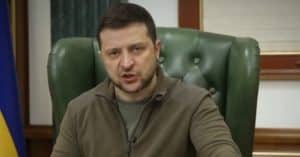Bishop Budde Challenges Trump at National Service
Bishop Mariann Edgar Budde of the Episcopal Diocese of Washington delivered a poignant sermon during the National Prayer Service that sparked widespread media attention.
Her message, aimed at President Donald Trump, highlighted themes of mercy and compassion, particularly for marginalized groups, marking her as a prominent figure in the so-called resistance against Trump's second term, but it also brought significant scrutiny, as Fox News reports.
Bishop Budde's message, delivered directly to President Trump and Vice President JD Vance, who attended the service with their families, quickly went viral. In her sermon, she addressed the fears and vulnerabilities of marginalized groups, including LGBTQ+ children and immigrants, making a plea for compassion and understanding. Her words resonated widely, gaining significant media coverage in various outlets.
Budde's comments during the service struck a chord when she implored the president to consider the fears of children from all political backgrounds who face threats due to their identities. She extended her plea to acknowledge what she said were the contributions of immigrants working in diverse essential jobs despite lacking formal citizenship status, urging the president to recognize their value to society.
Budde Gains Media Attention
Following the service, Bishop Budde's remarks were picked up by multiple media platforms, leading to appearances on CNN, the New York Times, The View, The Rachel Maddow Show, NPR, TIME magazine, and the Associated Press. Her visibility placed her in the mainstream spotlight, marking her as a significant voice in opposition to the administration.
During an interview with CNN's Erin Burnett, Budde articulated her intent behind the sermon. She emphasized the need for President Trump to embrace a stance of mercy and broaden the compassion toward the most vulnerable in society. Her appearance reflected the support she received for her stance, as well as the criticism from some quarters.
In response, President Trump took to Truth Social to disparage Budde as a "Radical Left hard-line Trump hater," suggesting that she and her church owed the public an apology. This backlash further amplified the media frenzy around Budde, setting the stage for a broader discussion.
Media Figures Weigh in on Budde's Message
Joy Behar, co-host of The View, opened her interview with Budde by praising the bishop's fearless stance, suggesting that her courage surpassed that of many congressional members. Similarly, The Rachel Maddow Show highlighted Budde's address as an exemplary act of speaking truth to power, cementing her role as an influential voice.
Critics and commentators, on both sides of the political spectrum, had varying interpretations of Budde's actions. Jeffrey McCall pointed out that Budde had seized the opportunity to position herself in a political spotlight, a move seen by some as necessary for challenging Trump's presidency. Meanwhile, others saw her as following a path similar to past figures who opposed the president.
Bishop Budde's sermon was seen by supporters as a reflection of core Christian values, a standpoint that for some community members stood in contrast to the divisive rhetoric currently prevalent. Notable figures, like CBS host Stephen Colbert, praised her message as beautiful and courageous, appreciating the discomfort it brought to the president.
Public Reactions Reflect Broader Sentiments
The public response was a mix of admiration and skepticism, with some lauding Budde's courage while others questioned her motives. Comedian Jimmy Kimmel humorously remarked on the unconventional nature of her sermon, while Ronny Chieng of The Daily Show joked about the discomfort it must have caused Trump.
Media coverage of Budde's confrontation with Trump extended beyond the usual political commentary, turning the bishop into a polarizing figure. Her words not only struck a national chord but also sparked a broader dialogue on the role faith leaders can play in political discourse.
As the first notable resistance figure against Trump's second term, Bishop Budde's journey demonstrates the complex relationship between faith, politics, and media. Her ability to galvanize attention serves as a reminder of the power voices from the pulpit can hold in the broader societal conversation.
Faith Leaders And Political Influence
This emerging narrative around Bishop Budde underlines a critical examination of how religious leaders can navigate the political arena. Her advocacy for compassion and empathy challenges ongoing political discourse, offering a perspective that resonates with a broad audience.
Her future engagements and media presence will likely continue to define her role as a pivotal figure in social and political dialogues. Budde's position as a voice of resistance exemplifies how leaders within religious communities may influence broader societal agendas.




